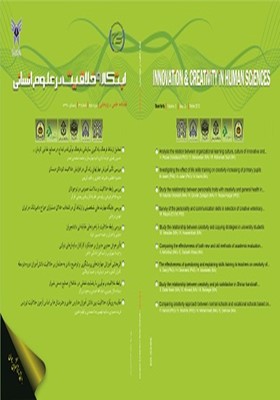تأثیر هوش معنوی مدیران بر عملکرد کارکنان سازمانهای دولتی
محورهای موضوعی : خلاقیت و نوآوری از جنبه‏های روان‏شناختی، علوم شناختی، علوم تربیتی و آموزشی (خلاقیت شناسی روان‏شناختی، خلاقیت شناسی پرورشی)وحیده اَسهرلوس 1 * , اسماعیل داداشی خاص 2
1 - نویسنده مسئول
2 - نویسنده
کلید واژه: هوش معنوی, عملکرد کارکنان, موهبت, تعالیجویی, سازمانهای دولتی,
چکیده مقاله :
زمینه: در اسلام به طور ضمنی هوش معنوی مورد توجه فراوانی قرار گرفته است. تشخیص الگوهای معنوی و تنظیم رفتار کارکنان بر مبنای آنها محور اصلی هوش معنوی هستند. در محیط های کاری سازمان های دولتی نیز پارادایم جدید معنویت و رشد و بلوغ معنوی ظهور پیدا کرده است. زمانی که موضوعات اخلاقی حل نشده باقی می مانند از رشد معنوی جلوگیری می کنند. هدف: معنویت می تواند به عنوان شکلی از هوش نمایان شود. هوش معنوی جنبه های بیرونی هوش را با جنبه های درونی معنویت، تلفیق می کند. هوش معنوی با حوزه وسیع در علم روانشناسی، در طول سال ها با گستردگی وارد علم مدیریت نیز شده است و مطالب نظری و یافته های پژوهشی و تجربی متعددی از جنبه های مختلف کاربرد هوش معنوی در محیط های کاری را مورد بررسی قرار داده اند. در این مقاله به سنجش هوش معنوی مدیران پرداخته می شود که بر اساس آن هوش معنوی ظرفیت انسان در پاسخ به سؤالات نهایی درباره معناداری زندگی و ارتباط زندگی درونی ذهن با زندگی بیرونی است و جنبه جدیدی از فعالیت های سازمان را آشکار می کند که هرگز به انسان ها، به چشم وسیله و ابزار نگاه نمی شود و با آنان همیشه با احترام و محبت رفتار می شود و به واسطه آن قابلیت های اخلاقی، علمی و اجتماعی کارکنان به سوی توفیق و سر بلندی رهنمون می گردد. روش: داده های این پژوهش از طریق پرسشنامه جمع آوری و با استفاده از نرم افزار spss تجزیه و تحلیل شد یافته ها: نتایج نشان داد هوش معنوی مدیران نقش و تأثیر بسزایی در عملکرد کارکنان دارد و مؤلفه معنا و هدفدار بودن کار بیشترین تأثیر و مؤلفه های شعور و خودآگاهی و موهبت و تعالی جویی در مراتب بعدی قرار دارند و در نهایت حقیقت اعمال مدیران کمترین تأثیر بر عملکرد کارکنان دارد. همچنین نتیجه نوینی در مورد تقویت عملکرد کارکنان از طریق بکارگیری هوش معنوی در سازمان های دولتی کشور به دست آمد. نتیجه گیری: هوش معنوی نه تنها در حوزه های فردی بلکه در حوزه های روان شناختی، وارد سایر حوزه های علوم انسانی از جمله مدیریت شده است. تحقیقات فزاینده در حوزه معنویت، مشاهده تأثیر چشمگیر آن، در بهبود عملکرد فردی و سازمانی بوده است. همچنین شواهد نشان می دهد که تمرین های معنوی باعث افزایش آگاهی و بینش نسبت به سطوح جدید چندگانه هوشیاری (تعمق) هستند و بر عملکرد افراد تأثیر مثبتی دارند تا در دست یابی به عملکرد خوب، آن را سرلوحه برنامه های کاری و شغلی و زندگی خود قرار دهند.
Background: Spiritual intelligence has been emphasized implicitly in Islam. Recognizing the Spiritual models and setting the employee behavior based on them is the main point of Spiritual Intelligence. In work environment of public organizations, a new paradigm of spirituality and spiritual growth and maturity has emerged out. When the ethical issues are unresolved, their Spiritual growth is prevented. Purpose: Spirituality can be reflected as a form of Intelligence. The Spiritual Intelligence combines the outer aspects of Intelligence with the inner aspects of Spirituality. The Spiritual Intelligence is a new issue which there are little theoretical materials and research and empirical finding about. This article is involved with measuring the Spiritual Intelligence of managers on which the ability of human to answer the serious question about the meaningfulness of life and the relationship of inner mind life with outer life is based and it reveals new aspect of organization activity which never consider people as tools but respects them and treat them kindly and respectfully and through that, the moral, scientific and social abilities of the employees are directed to were success and prosperity. Method: The data in this research were gathered through questionnaire and were analyzed by using the social science analysis software. Result(s): The results showed that the Spiritual Intelligence of managers has a remarkable effect on the employee performance and the meaning component have the greatest effect and the components of consciousness, grace and transcendence are in the later ranks, and at last the truth of the managers action has the least effect on the employee performance and also a new result was obtained about the new concept of Spiritual Intelligence as a solution to strengthen the employee performance in the public organizations in country. Conclusion: The Spiritual Intelligence has entered the other fields of humanities including management, not only in the individual fields but also in the psychological ones. The increasing researches in Spirituality have indicated the remarkable effect of it in the individual and organization performance. Also, the evidence indicate that the spiritual exercises, increase the awareness and knowledge to new multiple level of Intelligence and have a positive effect on the performance of people to look at it as directing light to achieve the job and life goals.

